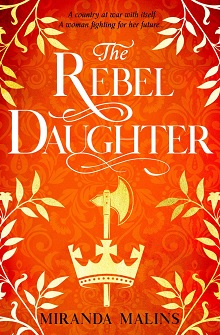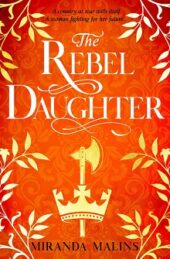Miranda Malins, author of The Puritan Princess, has returned to the Cromwell’s and provided a real treat: a step back in time, to the 1640s, to trace the family’s uneasy rise to power. This time, however, a different Cromwell daughter – Bridget – takes centre stage.
The great problem with Civil War stories has been that they are unfairly labelled “men’s history”: that is, history which foregrounds men’s actions and which, supposedly, appeals to men. This assumption is unfortunate, as Malins makes clear. What The Rebel Daughter reveals is the centrality of women to “men’s history”: clashing arms on battlefield was reserved for men, certainly – but who dressed their wounds? Who fed them? Who kept up homes and farms in their absence? And whilst the political arena of the day gave men all the key positions, we must ask why women, then, were engaged in intelligence work? Why did women figure so prominently in propaganda and in Puritanical tracts on virtue and family?
The Civil Wars were not for, about, and fought solely by men. This is clear from the beginning of The Rebel Daughter, during which we see conflict arrive on the Cromwells’ doorstep when only his female relatives are in residence; it quickly becomes a house under threat, fear, and siege. And it becomes a house in which the women fight back.
Nor is this moment of tension (or any other) depicted heavily. Malins is wise enough to wear her research lightly. Her handling of historical details – foodstuff, lighting, furnishings – is almost hidden under the fast pace of the narrative; as the Cromwells are threatened, we scarcely realise that we are seeing a mid-17th century household dissected, its contents laid bare as its defenders seek to protect all they have.
The power of the book lies in the centrality of Bridget “Biddy” Cromwell. As our protagonist, the narrative rests on her shoulders, and Malins ensures that the character balances it ably. We witness her not just survive but grow and thrive: through terror, threat, marriage, and loss, to become an intelligent, assertive figure. As we witness her family decline in fortune – and members – as the tumultuous war rages on, we see her – and them – rise to the challenges.
Malins resists the urge of previous writers who have explored women’s roles in the period. This is decidedly not a rose-tinted depiction of well-coiffed ladies torn between homely parliamentarians and dashing cavaliers. Even the relationship and marriage (first transactional and ultimately loving) between Bridget and Henry Ireton never descends to the saccharine – and, thankfully, Ireton’s personality, interesting though it is, is never permitted to eclipse Bridget’s.
Indeed, The Rebel Daughter is not simply a woman’s journey set obliquely against the backdrop of civil war. Bridget is at the centre of it – in the heat of the action. She is close enough to read the chances of survival of wounded soldiers; and as she is Cromwell’s daughter, we are given a sympathetic – though, crucially, not idealised or sugar-coated – view of the man. This Cromwell does not lose his fundamentalist self-belief, nor is he yet the Protector seen in The Puritan Princess. Rather, he is a driven, sometimes doubtful man imbued with a frightening intensity. As well as watching him develop through his daughter’s eyes, we are able to follow the ups and down of the wars, the rising and falling fortunes of the royalists and their king and queen, and the human toll on both sides. This is neither men’s history nor women’s history. It is good, gripping history, sharply and immediately told.
The Rebel Daughter, published by Orion, is the second novel from Miranda Malins.
Steven Veerapen is an academic, writer and the author of fiction set during the Tudor and Stuart periods. He teaches Renaissance Studies at the University of Strathclyde, and his new novel Of Blood Descended is out now, published by Polygon.







